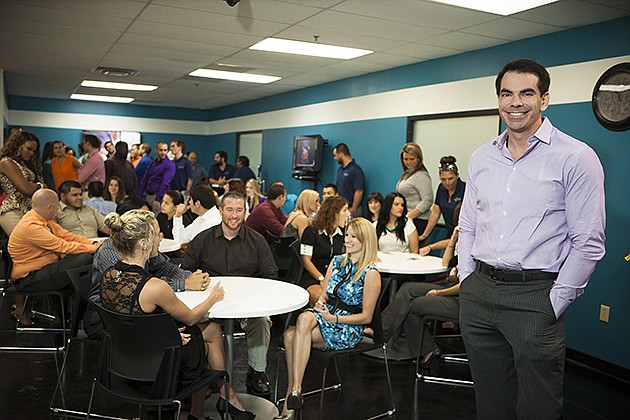- November 24, 2024
-
-
Loading

Loading

A millennial by definition is a person born in the period after Generation X, generally born between the 1980s and early 200s. However, Bobby Harris, CEO of Riverview-based BlueGrace Logistics, defines a millennial as “someone who shifts jobs every two years, wants a lot of vacations, is hands on, and doesn't want to work much,” Harris says. If that's the case, Harris says he'd rather go with someone else.
To the common notion that millennials want a job with purpose, Harris says: “well so did baby boomers and Gen X.”
Despite Harris' characterization of the millennial generation, he nonetheless has created a workplace that attracts workers in that age range. The difference, Harris says, is he isn't trying.
Harris, 40, says he gets frustrated with companies that “overthink the whole millennial thing.” They are too focused on what they can do to attract them, he says. But there's no special trick. “They'll come to you if you create the environment,” Harris insists.
For BlueGrace, that environment includes free beer on Fridays, dunk tanks and a huge annual Halloween party. BlueGrace employees are also able to help create the daily environment. Every employee is invited to submit two songs to play in the overhead music playing throughout the office.
Many companies think millennials should work in a call center atmosphere, crammed together with lots of desks, and you “throw a couple of nerf guns and skateboards” and call it a cool place to work, Harris says. BlueGrace doesn't believe in that approach. Instead, the company gives new hires bigger desks in an open environment. But the biggest attraction is giving them autonomy.
Although he doesn't buy into the idea that millennials are more tech-savvy than other employees, Harris does have an open social media policy. If Harris sees an employee on Facebook or Twitter, he isn't fazed, he says. “People need a mental break, and a professional has the freedom to do what they want.”
Harris even encourages use of Twitter. He sees it as an additional way to connect with new employees. “It makes me less of a CEO in the office and more a person they know,” Harris says.
According to MTV's “No Collar Workers” survey, 95% of millennials are “motivated to work harder when I know where my work is going,” and nine out of 10 millennials want executives to listen and credit their ideas. More than 75% of millennials would like to have a mentor, and 80% would like feedback from their boss.
Despite his indifference to attracting this generation, Harris seems to have established a workplace that excels in doing so.
Harris says the most important part of setting up a good work environment for any age employee is transparency and openness to suggestions. “No. 1 they have to know where we're going, No. 2, they have a voice on where we're going,” he says.
Once a week Harris sends a question to the whole company, asking how happy employees are with their roles, and one thing they'd like to see change. Harris personally responds to every email suggestion.
BlueGrace also emphasizes career growth and personal development, setting up all employees with a mentor for their first six months, and inviting them to executive forums after that. The company also offers a peer-to-peer award where an employee can give a colleague $50 for staying late or helping with a task.
As a young CEO, people who ask Harris his opinion on hiring the next generation are often surprised. Harris remembers a hiring guru telling him that he should bring a millennial's mom and dad into the interview because parents are so involved in decision making these days. Harris responded, “If someone brings their mom to an interview, I don't want to hire that person.”
Harris ignores age and looks for people who love work because they like what they are doing, and who don't look at it as just a job, he says.
As far as millennials go, Harris says, “You don't have to treat them differently than anyone else in the company.”